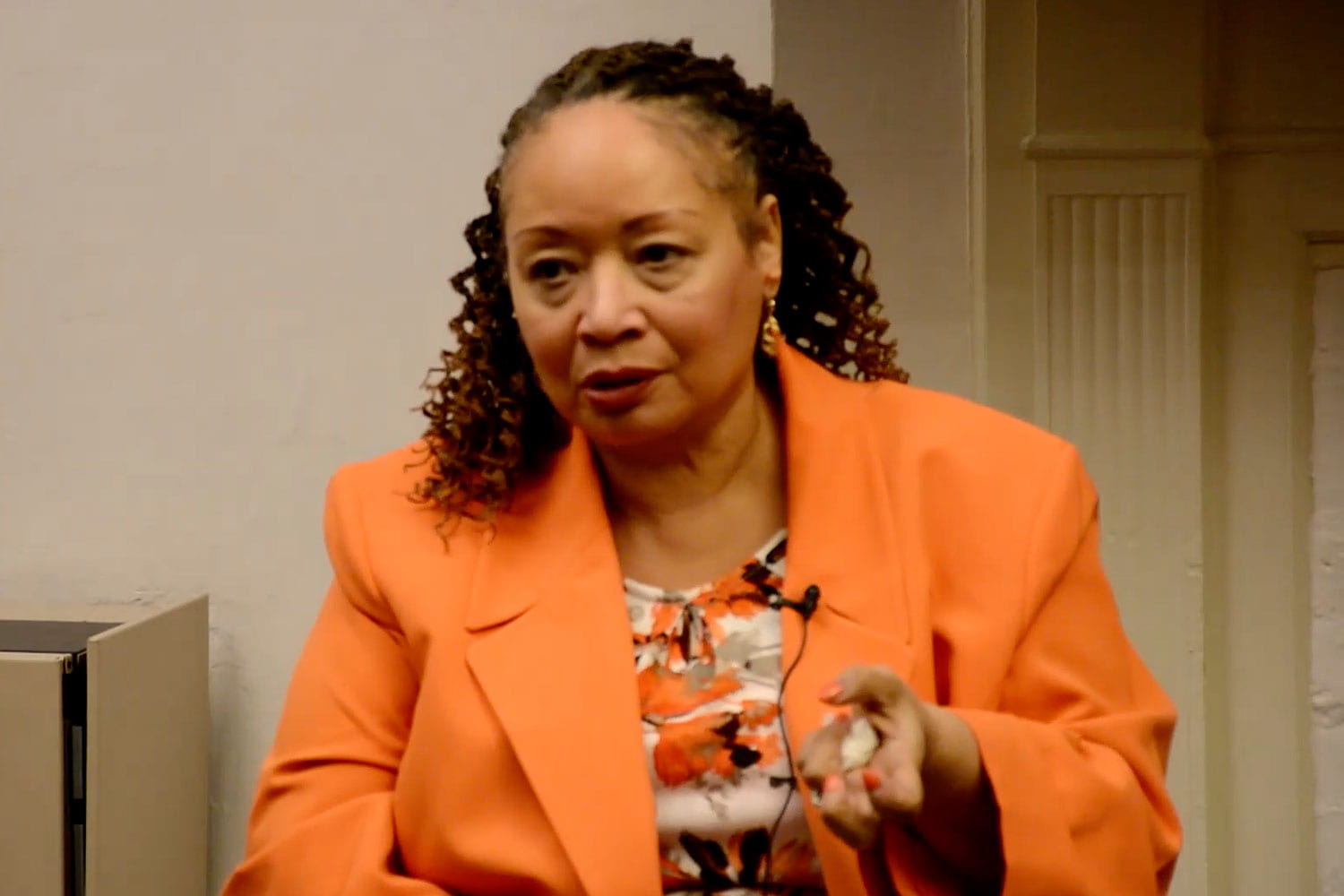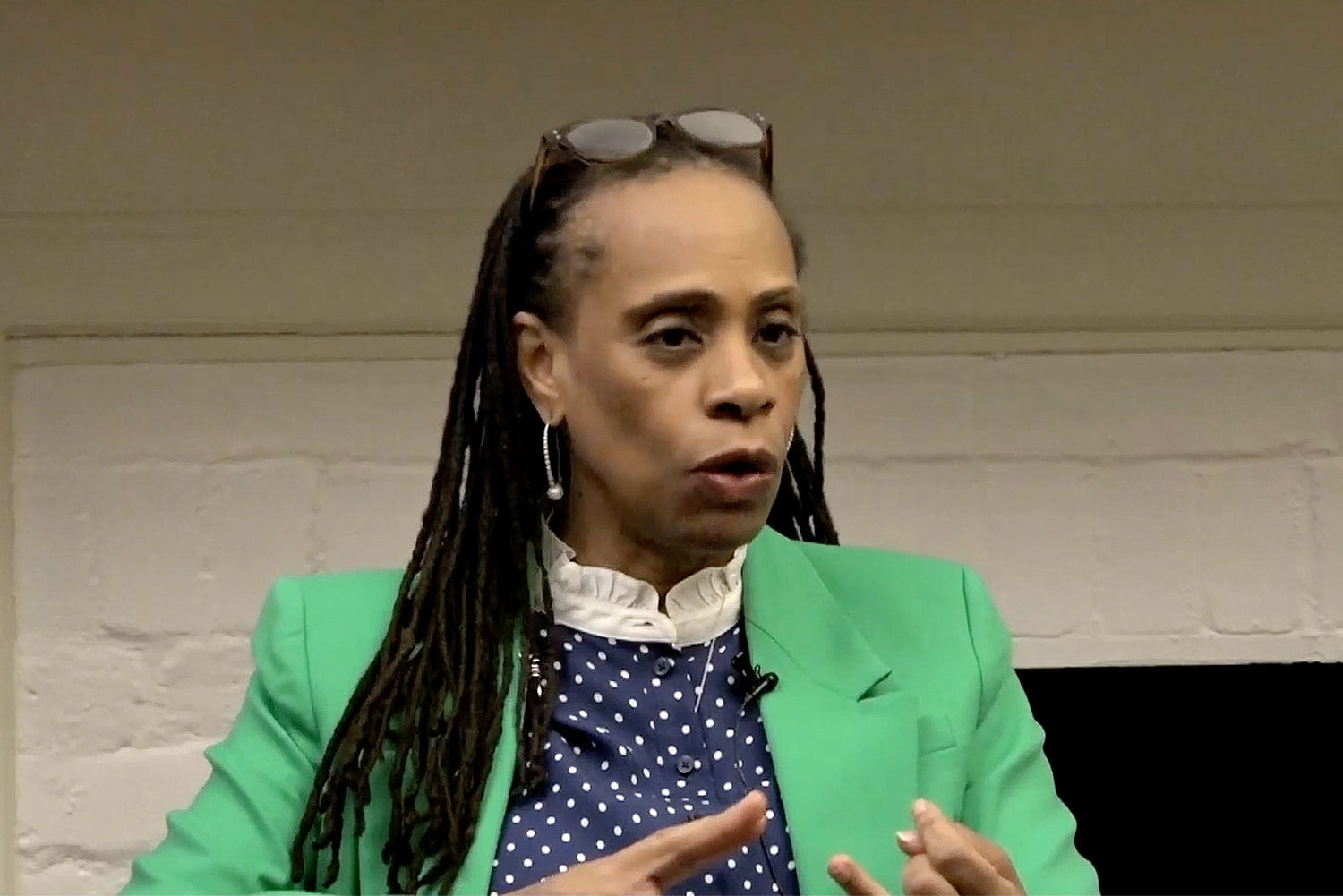Social justice is among the core values of social work. In the first year of his tenure, Dean Michael A. Lindsey has been honoring NYU Silver’s tradition of clinical excellence while strengthening the School’s emphasis on addressing the structural forces that keep people from thriving and perpetuate disparities.
Conversations on Centering Social Justice in Social Work
The 2022-2023 academic year saw the appointment of NYU Silver’s inaugural Visiting Scholar, FPWA CEO and Executive Director Jennifer Jones Austin. She and Associate Dean for Academic Affairs Linda Lausell Bryant curated a three-part series of Conversations on Centering Social Justice in Social Work.
Dean Lindsey, Dr. Lausell Bryant, and Jones Austin kicked off the series themselves with a discussion of what it means to center social justice in social work education, practice, and research. They emphasized the need for social workers to work with, not on, their clients; address the needs of individuals, families, and communities while recognizing how their lives are shaped by oppressive systems; and take action to change those systems
 “Putting social justice at the center of social work means changing our lens on the people we are trying to help and our role in that equation,” said Dr. Lausell Bryant. “Are we fixing broken people or are we helping people to find their own liberation with our support and our partnership?”
“Putting social justice at the center of social work means changing our lens on the people we are trying to help and our role in that equation,” said Dr. Lausell Bryant. “Are we fixing broken people or are we helping people to find their own liberation with our support and our partnership?”
“It’s not enough to just do our work and close up shop and go home,” added Dean Lindsey. “I think about what are those next steps and things that we can do to really shape outcomes for our clients?”
Jones Austin said that in her role as a Visiting Scholar at Silver, she aims to support students in being such change agents. As a disrupter herself, she said, “I want you to have the knowledge and the agency to say ‘my work matters and my work can inform and reform the system. I imagine something more and I can be that something more.”’ In the second conversation in the series, Dr. Lausell Bryant and Ms. Jones Austin engaged in a discussion with New York City Deputy Mayor Anne Williams-Isom about centering social justice in social work practice and the delivery of health and human services. The three shared insights from their decades of leadership in the sector, with an emphasis on the need to move beyond crisis to address root causes and reform systems.
A key theme all three women emphasized was the need for health and human services organizations to do less harm. For example, they cited the damage that can occur for families that have a child welfare call made against them, or a child placed in foster care. Even an unsubstantiated ACS case on their record opens families up to scrutiny and prevents them from being foster parents.
“I’m not a person who doesn’t believe in child safety,” said Williams-Isom, “but everybody can’t be calling things in. And so today, I said to my staff, do we have the data [on places that are submitting a disproportionate number of SCR reports]? Let’s look at the schools….Why don’t we use the data to stop the harm [families experience from unsubstantiated reports] instead of just saying like ‘oh boy, isn’t this terrible?’ And I can say the same thing about hospitals and other places.”
 Jones Austin agreed and noted that in her position, Williams-Isom is overseeing systems that are structurally oppressive by design. Furthermore, she said, “our systems are set up in such a way that sometimes we are treating problems rather than working to cure them.” Rather than such “Band-Aid solutions,” Jones Austin, Dr. Lausell Bryant, and Williams-Isom are focused on “reimagining human services” to get at the core issues.
Jones Austin agreed and noted that in her position, Williams-Isom is overseeing systems that are structurally oppressive by design. Furthermore, she said, “our systems are set up in such a way that sometimes we are treating problems rather than working to cure them.” Rather than such “Band-Aid solutions,” Jones Austin, Dr. Lausell Bryant, and Williams-Isom are focused on “reimagining human services” to get at the core issues.
The series concluded with Dean Lindsey and Ms. Jones Austin in conversation with the Reverend Al Sharpton on the unfinished business of social justice 60 years after the March on Washington for Jobs and Freedom. Reverend Sharpton stressed that “Unless you have an intersectional movement, you don’t have a movement at all.” Toward that end, he said, he and Martin Luther King III would be announcing a March on Washington to be held in summer 2023 with a broad civil rights agenda “not to commemorate the [1963] march but to say the work is not over.”
Among the issues Reverend Sharpton said need to be centered to, as Ms. Jones Austin put it, “give life to the dream” are preserving voting rights, addressing criminal justice reform, securing a woman’s right to choose and gender equality, and combating homophobia and xenophobia. He recalled that in 1963, no women were among the speakers and march organizer Bayard Rustin was asked to stay in the background because he was gay. The march Reverend Sharpton and Martin Luther King III are organizing will “be for everybody” because “you can’t free yourself unless you’re going to fight for everybody else.”
Reverend Sharpton also stressed the importance of service, saying that he learned from his mentors, Reverend William A. Jones Jr. and Reverend Jesse L. Jackson Sr., “that the value of your ministry was the service that you did.” Martin Luther King Jr., he noted, had a PhD from Boston University, won the Nobel Peace Prize and the Presidential Medal of Freedom “and still went down to march with garbage workers, and still said we’re going to have a Poor People’s Campaign. It’s a calling.”
Asked by Dean Lindsey what new social work students about to go into the field should be considering, Reverend Sharpton said, “You should ask yourself, am I going to go and try to make a difference for somebody person by person? Am I going to serve because I believe in service or am I just checking off a box? And if you’re checking off a box, don’t do it. You need to find something else to do. Service in and of itself is a reward.”
While the series itself is over, NYU Silver’s commitment to centering social justice in social work is enduring and fundamental to our mission.
Other Developments Relating to Social Justice and DEI
Since Spring 2021, the Office of Diversity, Equity, and Inclusion, led by Dr. Richeleen Dashield, has conducted restorative justice (RJ) seminars for 154 participants. The RJ program is a process to repair relationships between individuals and communities. Moreover, the RJ program continues to serve as a consultant providing support in the classrooms, departments, and with individuals.
This year, student orientations for BSW, MSW, Ph.D., and DSW offered the opportunity to learn and practice self-reflection by utilizing a restorative justice lens to engage in social justice dialogue and learning, develop classroom community agreements, and build and strengthen relationships. Likewise, 52 faculty, staff, and students (BSW, MSW, DSW, and Ph.D.) participated in 4 to 9 hours of RJ sessions.
During the 2022-2023 academic year, Drs. Linda Lausell Bryant and Doris Chang organized the first three-part series on Transformative Education, featuring Drs. Grace S. Kim and Karen Suyemoto, the authors of the textbook Teaching Diversity Relationally: Engaging Emotions and Embracing Possibilities. This workshop was attended by 45 full-time and adjunct faculty, staff, and doctoral students.
The Antiracism for Staff Working Group engaged in a community book read and discussion of How We Show Up by Mia Birdsong and hosted an Author Talk attended by staff, faculty, and students.
An Alumni in Residence initiative was also launched by our Career & Professional Development team. The inaugural Alum in Residence, Luisa Lopez, delivered a set of recommendations on institutionalized support and resources for Latine students in the spring.
In the Spring of 2023, new MSW and transfer BSW students were provided a high-level overview of key terminology and frameworks related to global inclusion, diversity, belonging, equity, and access. This seminar was co-created by the Office of Global Inclusion, Diversity, and Strategic Innovation at NYU and the Office of Inclusive Engagement & Student Life. Meanwhile, the Inclusive Engagement and Student Life office reconstituted the socioemotional support school-wide committee to review and determine the priorities to institutionalize socioemotional support and to address issues affecting BIPOC students at Silver.
Throughout the 2022-2023 academic year, the Social Justice Praxis Committee, composed of Silver faculty, students, staff, and alumni, continued to catalyze the development, implementation, and assessment of a comprehensive strategy and tactics of action to address social justice, equity, and inclusion at the School. The Social Justice Praxis Committee’s Statement: In the Face of Anti-Asian and Anti-Black Violence (February 2023) called on the community to lead with praxis (theory and action) and community care.

